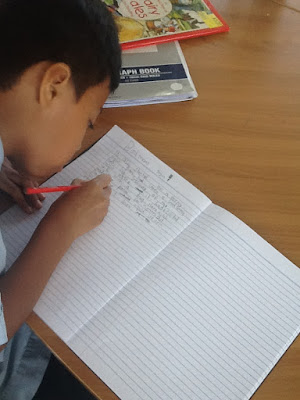Some Strategies For Improving Student Writing Outcomes
One of our primary aims as teachers of writing is to assist the inexperienced writer to narrow the gap between their intentions and actions.
Going forward there are some specific actions we need to focus on such as assisting students to develop writing stamina and experience success.
Here are some issues that may arise with student writers and some suggestions as to how we might assist them to overcome these obstacles to writing success.
If I see this…
|
I might
|
Strategies
|
A student is just going through the motions with a writing piece.
|
Assist the student to unearth topics to write down that provide genuine reasons for writing that go beyond just writing.
|
Listing, gathering ideas, gathering artifacts. Talking to other writers.
|
Students essentially write about the same topic time after time.
|
Talk with students about other reasons that writers write. Consider writing about the topic in a different genre. Nudge them to try something that will move them beyond the comfort zone they have developed.
|
Research a range of book types that deal with common themes/ topics. Investigate same topic across different genres.
|
A student isn’t sure which genre they should choose for their writing idea.
|
Ask the student why they want to write about the chosen topic and suggest genres writers typically choose to write in to fulfil that purpose.
|
Share writing samples from various texts.
|
A student isn’t able to identify an audience for the writing being completed beyond ‘the teacher.’
|
Brainstorm a list of people with whom the writer can share the writing, or places the writing could be displayed.
|
Demonstrate how to brainstorm.
|
Students are writing’ breakfast to bedtime’ stories or, 'all about' non fiction pieces.
|
Show the writer how to write a plan for their piece and focus on developing a particular part of the story in greater detail.
|
Zooming in, small moments, unpacking heavy sentences.
|
The meaning of the piece is unclear or confused.
|
Ask the writer, ‘What are you trying to say in this piece/’ and provide assistance to rewrite the part in which the point of the piece is identified. (Usually the lead or the ending).
|
Effective leads and endings.
|
Students’ writing contains limited features of the genres in which they‘re writing.
|
Share examples of genres and point out features they could include in their writing and nudge them to do so. Ask, how do these features assist the reader?
|
Examine text features and structures. Create anchor charts.
|
Each part of the students writing receives the same amount of attention.
|
Ask the student to identify the most important part of the piece and discuss how writers usually develop the most important parts of the piece more than the others to draw attention and build tension.
|
Zooming in, Lift A Line, Show Don’t Tell. Writing big about important small moments.
|
A student relies too heavily on the word ‘then’ for time transitions when writing narratives, recounts.
|
Teach a range of time transitions that other authors use.
|
Conduct an inquiry into how authors deal with time transitions.
|
When writing non fiction pieces the writing shifts abruptly from one point to the next.
|
Show the student how to organize the writing using subheading, topic sentences, bullets to assist the readers to negotiate different parts of the text.
|
Teach a range of structural features for non fiction texts.
|
The writer uses general words in the writing when more specific words would be more effective.
|
Encourage the writer to visualize aspects of the topic and then select the best possible words to use to describe what is being written about. E.g. dog becomes fox terrier.
|
Brainstorm precise words going from general to specific.
|
The student seems detached from the action in the writing.
|
Show the writer how to draw the reader closer by including thoughts and emotions in the writing, or pronouns such as I or you.
|
Teach the inside/outside strategy to take the reader inside the narrator/characters head.
|






Comments
Post a Comment